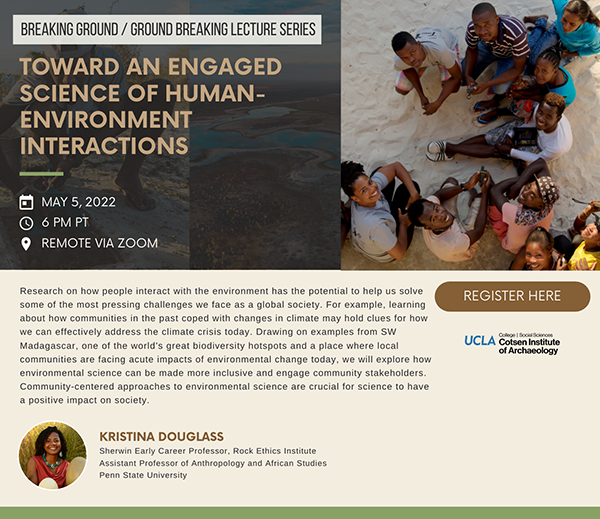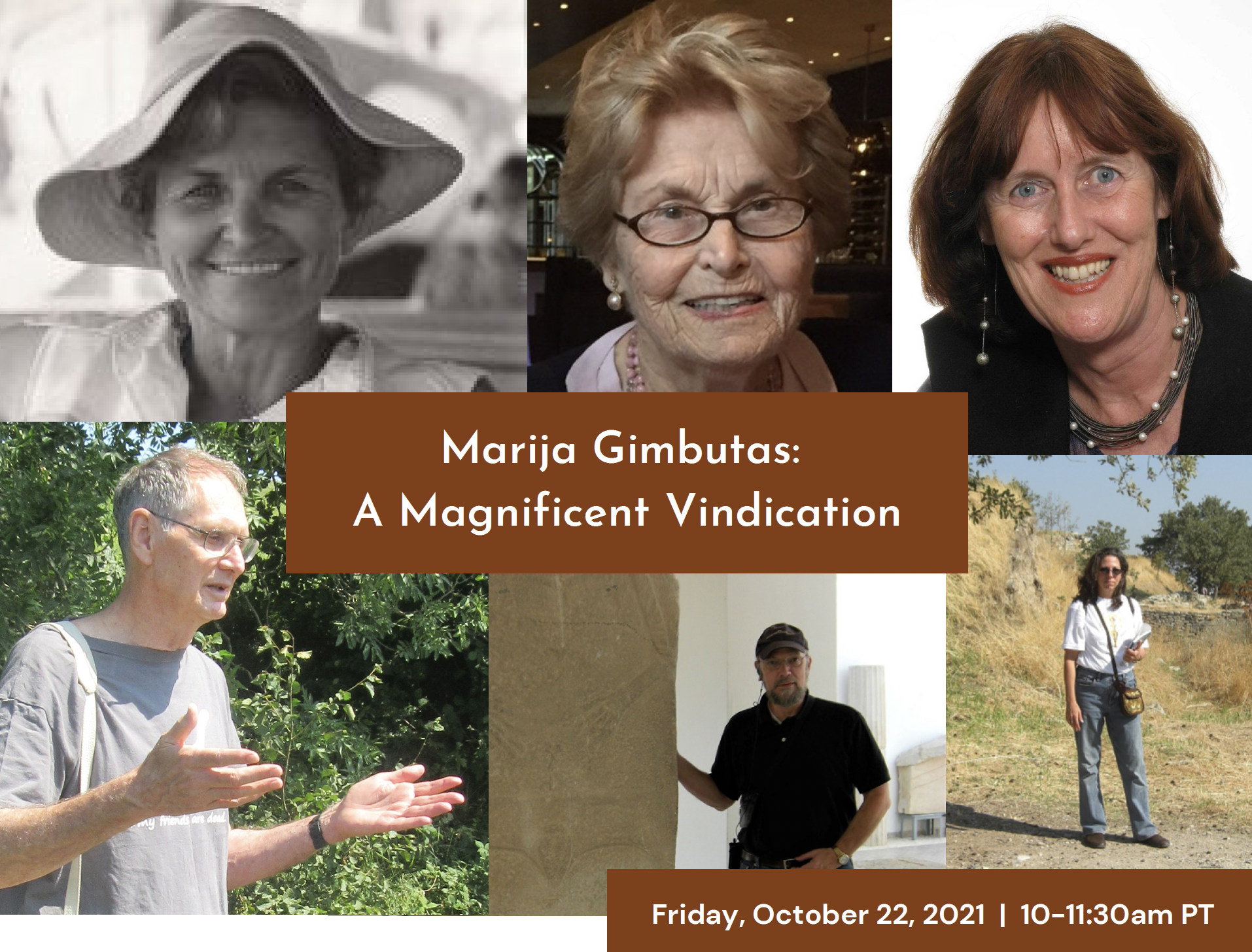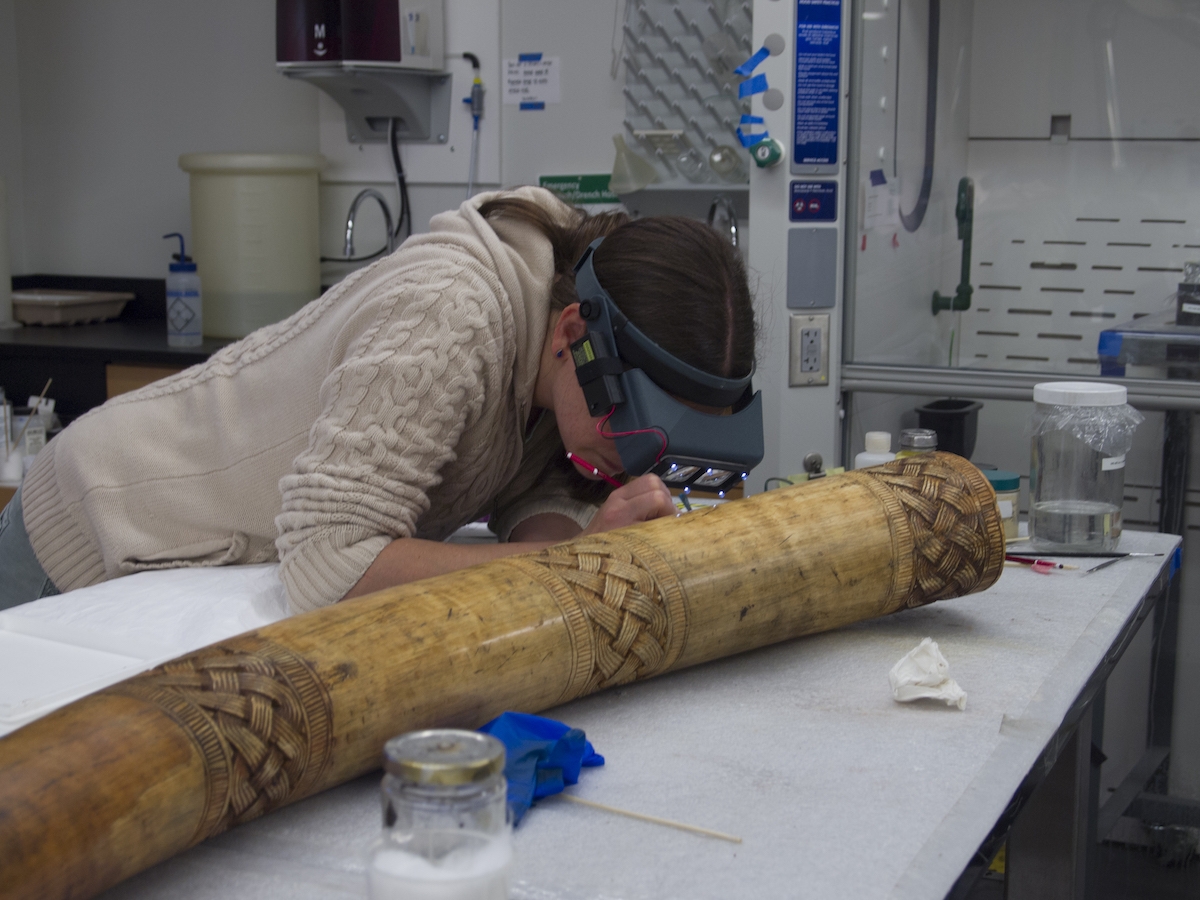Past Events
Interested in Cotsen events? Sign up for our mailing list.Archaeology and anthropology were once closely related fields of research. Today, they have drifted apart. David Wengrow reflects on his book, co-authored with David Graeber: The Dawn of Everything: A New History of Humanity, which is an attempt to see what happens when you put them back together again, after a period of mutual estrangement. The results are surprising, and have significant implications across the social sciences, presenting an overall picture of human history and development that is starkly at odds with received theories and conventional wisdom.
June 8, 2023
In-person at the Lenart Auditorium, Fowler Museum
6pm Lecture
7pm Reception
Email mjacobson@ioa.ucla.edu to RSVP for the in-person lecture and reception (required).
David Wengrow is Professor of Comparative Archaeology at the Institute of Archaeology, University College London (UCL) and has been a visiting professor at New York University, the University of Auckland, and the University of Freiburg. David has conducted archaeological fieldwork in Africa and the Middle East. He is the author of three books including What Makes Civilization?, and co-author with David Graeber of The Dawn of Everything: A New History of Humanity.
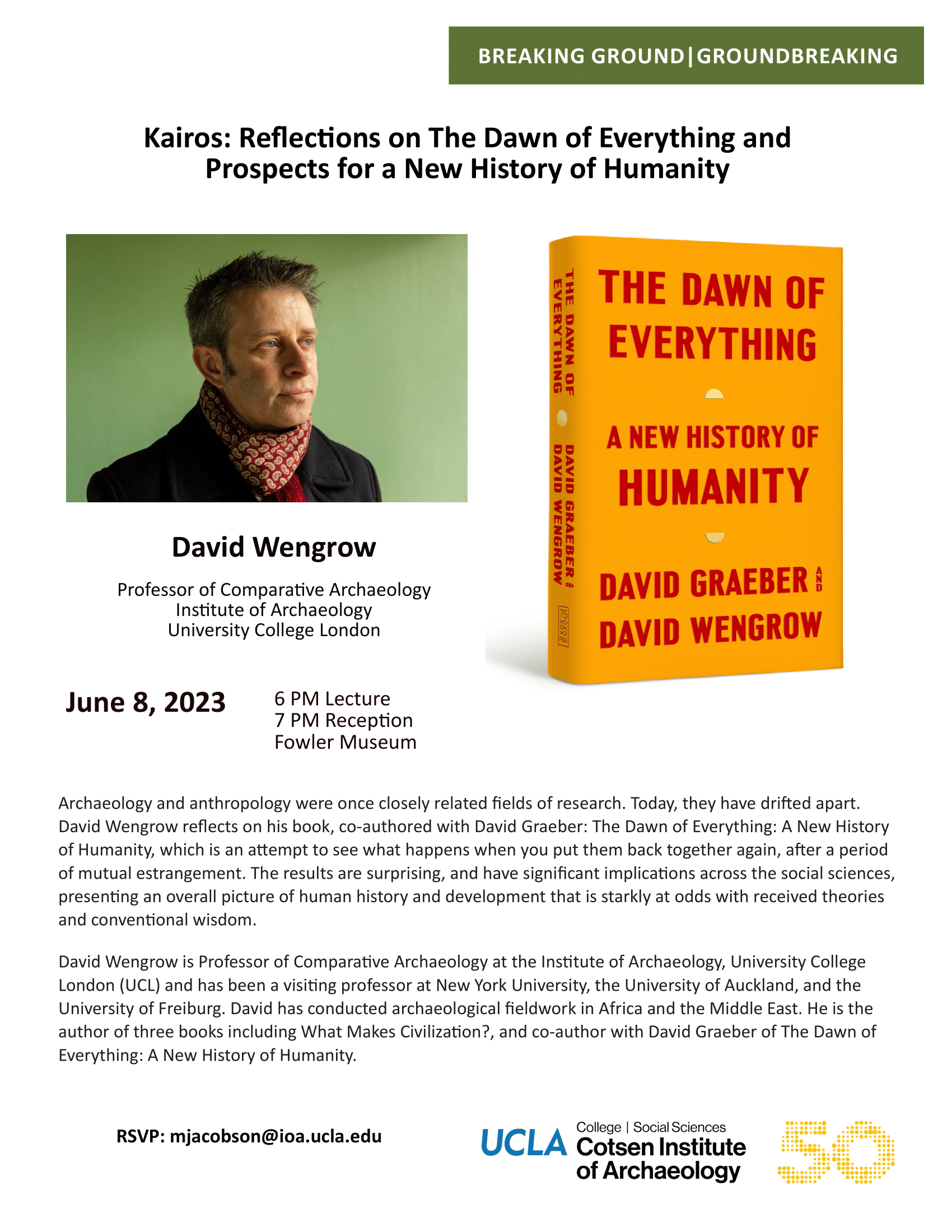
Contact Michelle Jacobson
Email mjacobson@ioa.ucla.edu
Phone
The newest publication from the Cotsen Institute of Archaeology Press, Archaeology Outside the Box, intends to make contemporary archaeology germane to the general public as well as researchers in other disciplines. In thirty-one richly illustrated chapters, a variety of projects is presented by an international group of archaeologists, anthropologists, architects, and artists. These aim to broaden the applicability of archaeology by reflecting on archaeological remains in novel ways or addressing contemporary concerns with archaeological theory and research methods. Demonstrating the fascinating and pertinent nature of archaeology, the authors go far beyond its definition as a discipline that unearths obiects of ancient material culture.
June 1, 2023
In-person at the Luskin Conference Center
6pm Lecture
7pm Reception
Online (Zoom)
6pm Lecture
Email mjacobson@ioa.ucla.edu to RSVP for the in-person lecture and reception by May 25 (required) or register for Zoom here.
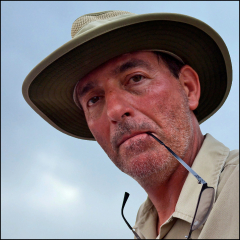 Hans Barnard has both an MD, and a PhD in archaeology from Leiden University in the Netherlands. Since 1990 he has participated in archaeological field projects throughout the world. He has published more than a hundred articles and book chapters, as well as several books, among which are the edited volumes The Archaeology of Mobility: Old World and New World Nomadism, with Willeke Wendrich; The History of the Peoples of the Eastern Desert, with Kim Duistermaat; and most recently, Archaeology Outside the Box, all published by the Cotsen Institute of Archaeology Press.
Hans Barnard has both an MD, and a PhD in archaeology from Leiden University in the Netherlands. Since 1990 he has participated in archaeological field projects throughout the world. He has published more than a hundred articles and book chapters, as well as several books, among which are the edited volumes The Archaeology of Mobility: Old World and New World Nomadism, with Willeke Wendrich; The History of the Peoples of the Eastern Desert, with Kim Duistermaat; and most recently, Archaeology Outside the Box, all published by the Cotsen Institute of Archaeology Press.
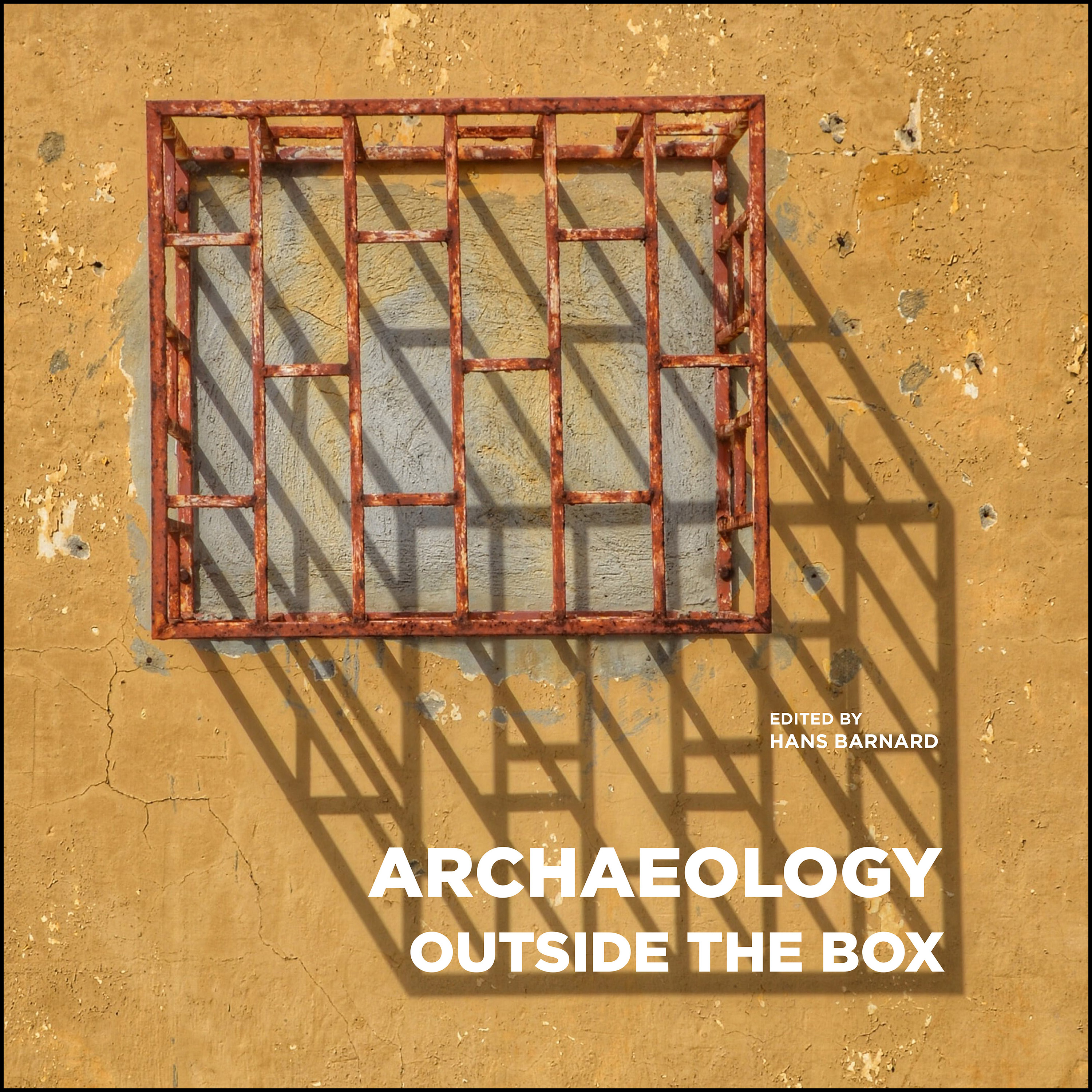
Contact Michelle Jacobson
Email mjacobson@ioa.ucla.edu
Phone
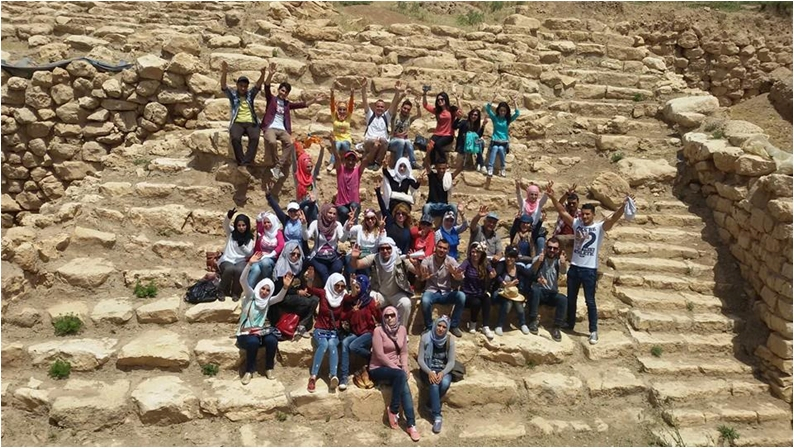 A conversation with
A conversation with
Giorgio Buccellati
Marilyn Kelly-Buccellati
Maryanne Wolf
February 16, 2023
6:00 PM PT
Remote via Zoom
Join us in unearthing the secrets of a 5,000-year-old civilization when cities first began to take shape. In northeastern Syria, the Hurrian city of Urkesh had been excavated and studied for twenty-five years before the work was halted by war. Learn how the study of Urkesh has been impacted by plundering and defacing but continues to engage the local community and provide impactful records even beyond archaeology. Archaeologists Giorgio Buccellati and Marilyn Kelly-Buccellati will be joined by neuropsychologist Maryanne Wolf for a conversation where cognitive psychology meets archaeology.
Registration Required
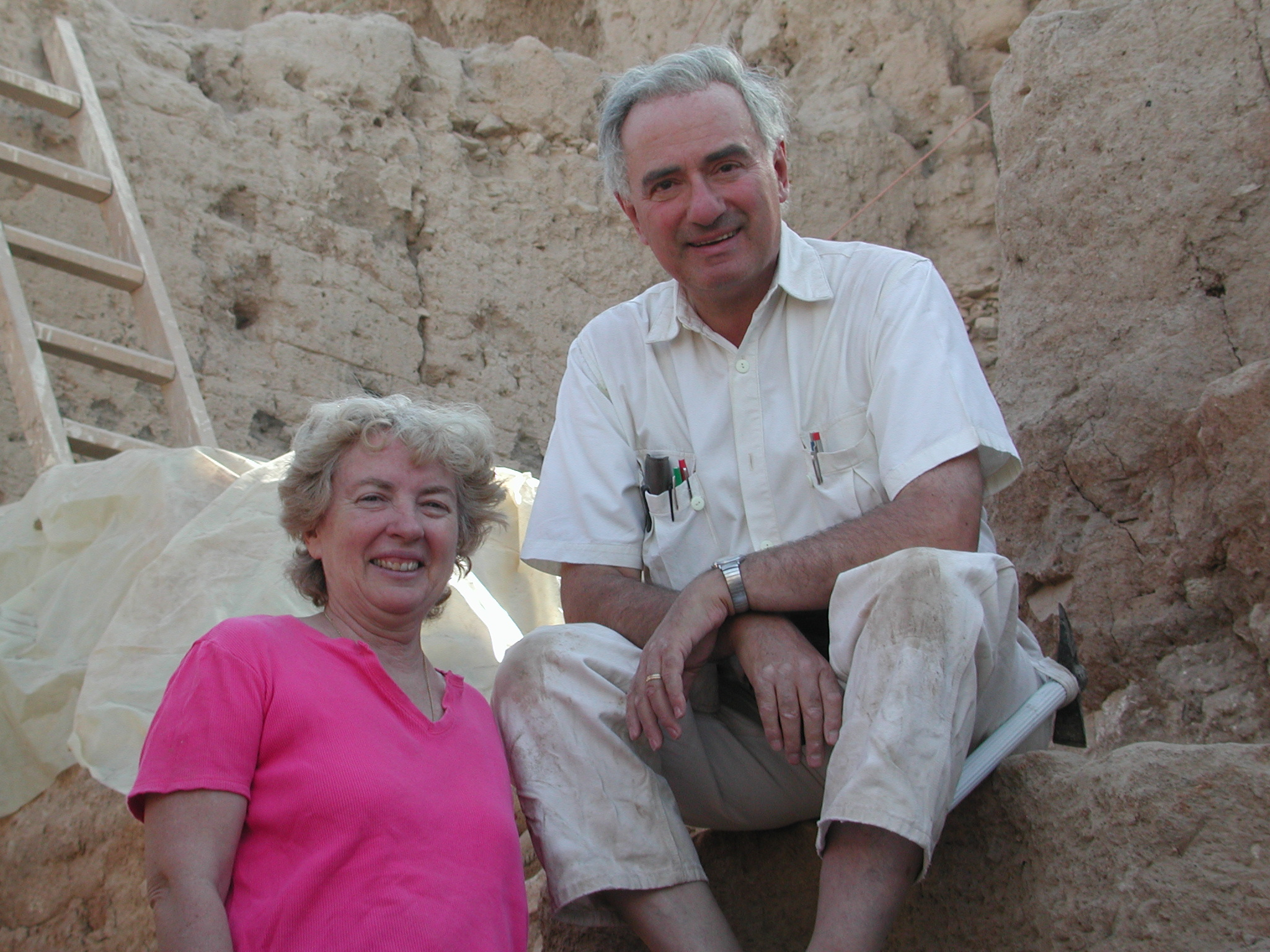
Contact Michelle Jacobson
Email mjacobson@ioa.ucla.edu
Phone
The Cotsen Institute of Archeology Press invites you to the latest Author Spotlight with
Stephen Dueppen
Associate Professor, Department of Anthropology
University of Oregon
Mounded sites (tells) are common throughout West Africa, including in western Burkina Faso where clusters of mounds dating to the past three millennia are common. Extensive fieldwork at the long inhabited and well-preserved site of Kirikongo (ca. 100—1650 AD), has established that the community started as a small farming settlement, grew to a large community centered on the village’s founders, rejected inequalities in an egalitarian revolution, and survived the Black Death pandemic. This talk explores patterns in architecture, material culture and organic remains (animal bones and botanical remains) to argue that the mounds at Kirikongo are not only residential, but also stratified ancestor shrines whose ritual deposits inform on the divine associations of different houses in a ritual landscape.
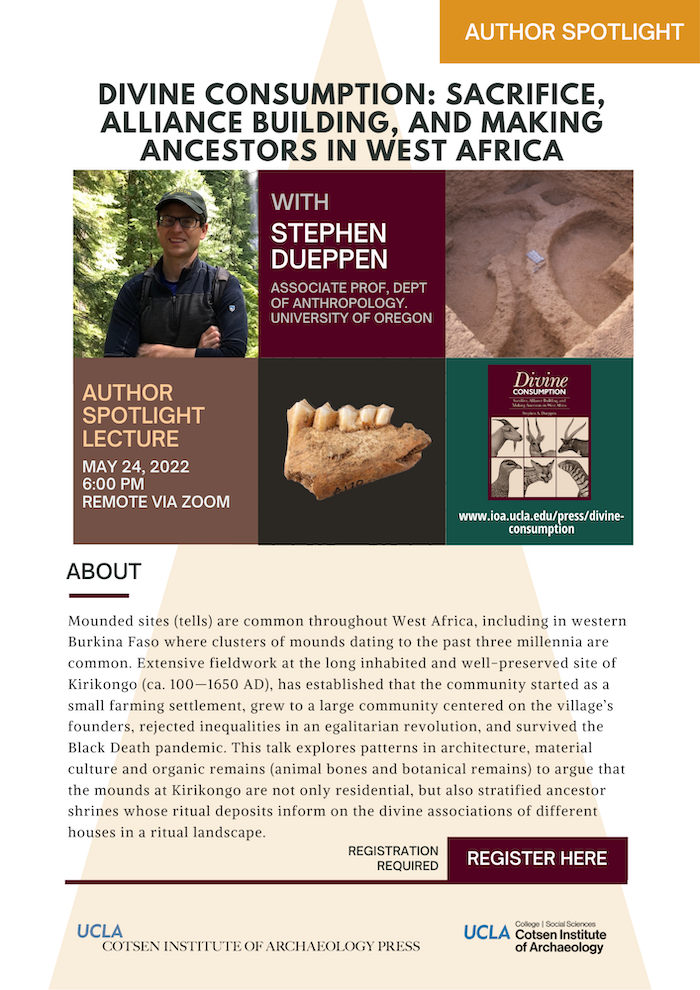
Contact Michelle Jacobson
Email mjacobson@ioa.ucla.edu
Phone
You are cordially invited to The Vishap: From Fairy Tale to Reality (click on link for schedule)
Sunday May 15th, 2022 at 2:00 - 6:00pm PDT
The Narekatsi Chair in Armenian Studies presents "The Vishap: From Fairy Tale to Reality," by Dr. Arsen Bobokhyan. This event is co-sponsored by the Promise Armenian Institute, the Ararat-Eskijian Museum, and the National Association for Armenian Studies & Research with the participation of the Research Program in Armenian Archaeology and Ethnography at the Cotsen Institute of Archaeology and the Institute for Archaeology and Ethnography of the Armenian Academy of Sciences.
2:00 - 3:30 PM Royce Hall 314
Illustrated Lecture on documenting and preserving the dragon-stones of Armenia from the 2nd millennium BCE by Dr. Arsen Bobokhyan (PI of this project and Director of the Institute of Archaeology and Ethnography in Yerevan), followed by a documentary of the dragon-stones and the initial phase of their investigation and restoration.
3:30 - 6:00 PM Powell Rotunda
Presentation of Dr. Bobokhyan's latest monograph Atrpet’s “Scientific Adventures” and Discovery of the Vishap Stelae (in Armenian), followed by a guided tour of an exhibit of thirty high-resolution images of the dragon-stones by Dr. Bobokhyan and recital by the UCLA Armenian Ensemble. The event will conclude with a Wine and Cheese Reception.
The event will livestream on the Ararat-Eskijian Museum's Facebook and YouTube pages.
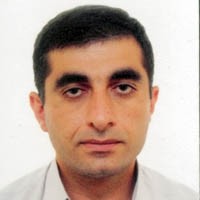 Arsen Bobokhyan is Directory of the Institute for Archaeology and Ethnography of the Armenian Academy of Sciences. He received his Ph.D. from the Institute of Prehistory at the University of Tuebingen (2008) and has since been an Asst. Professor of History at Yerevan State University and Lecturer at the American University of Armenia. The author of three books and over a hundred articles, he has served as editor of a number of scholarly journals and has been invited as visiting professor at several universities in the German-speaking world. His research interests include the early Archaeology of the Armenian Plateau and the Caucasus, the Near East and Asia Minor, Cultural Relations, Ancient Barter and Weight Systems and Religion and Cult.
Arsen Bobokhyan is Directory of the Institute for Archaeology and Ethnography of the Armenian Academy of Sciences. He received his Ph.D. from the Institute of Prehistory at the University of Tuebingen (2008) and has since been an Asst. Professor of History at Yerevan State University and Lecturer at the American University of Armenia. The author of three books and over a hundred articles, he has served as editor of a number of scholarly journals and has been invited as visiting professor at several universities in the German-speaking world. His research interests include the early Archaeology of the Armenian Plateau and the Caucasus, the Near East and Asia Minor, Cultural Relations, Ancient Barter and Weight Systems and Religion and Cult.
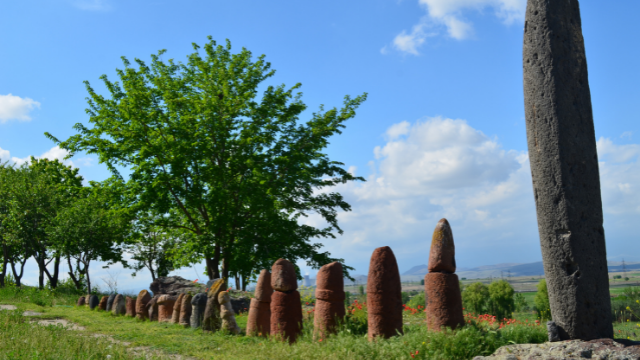
Vishapakar (Photo: Sonashen via Wikimedia Commons, 2013; cropped. CC BY-SA 3.0)
Contact Kristine Martirosyan-Olshansky
Email kristineolsh@ucla.edu
Phone
Kristina Douglass, Sherwin Early Career Professor in the Rock Ethics Institute and Assistant Professor of Anthropology and African Studies
Research on how people interact with the environment has the potential to help us solve some of the most pressing challenges we face as a global society. For example, learning about how communities in the past coped with changes in climate may hold clues for how we can effectively address the climate crisis today. Drawing on examples from SW Madagascar, one of the world’s great biodiversity hotspots and a place where local communities are facing acute impacts of environmental change today, we will explore how environmental science can be made more inclusive and engage community stakeholders. Community-centered approaches to environmental science are crucial for science to have a positive impact on society.
Kristina Douglass
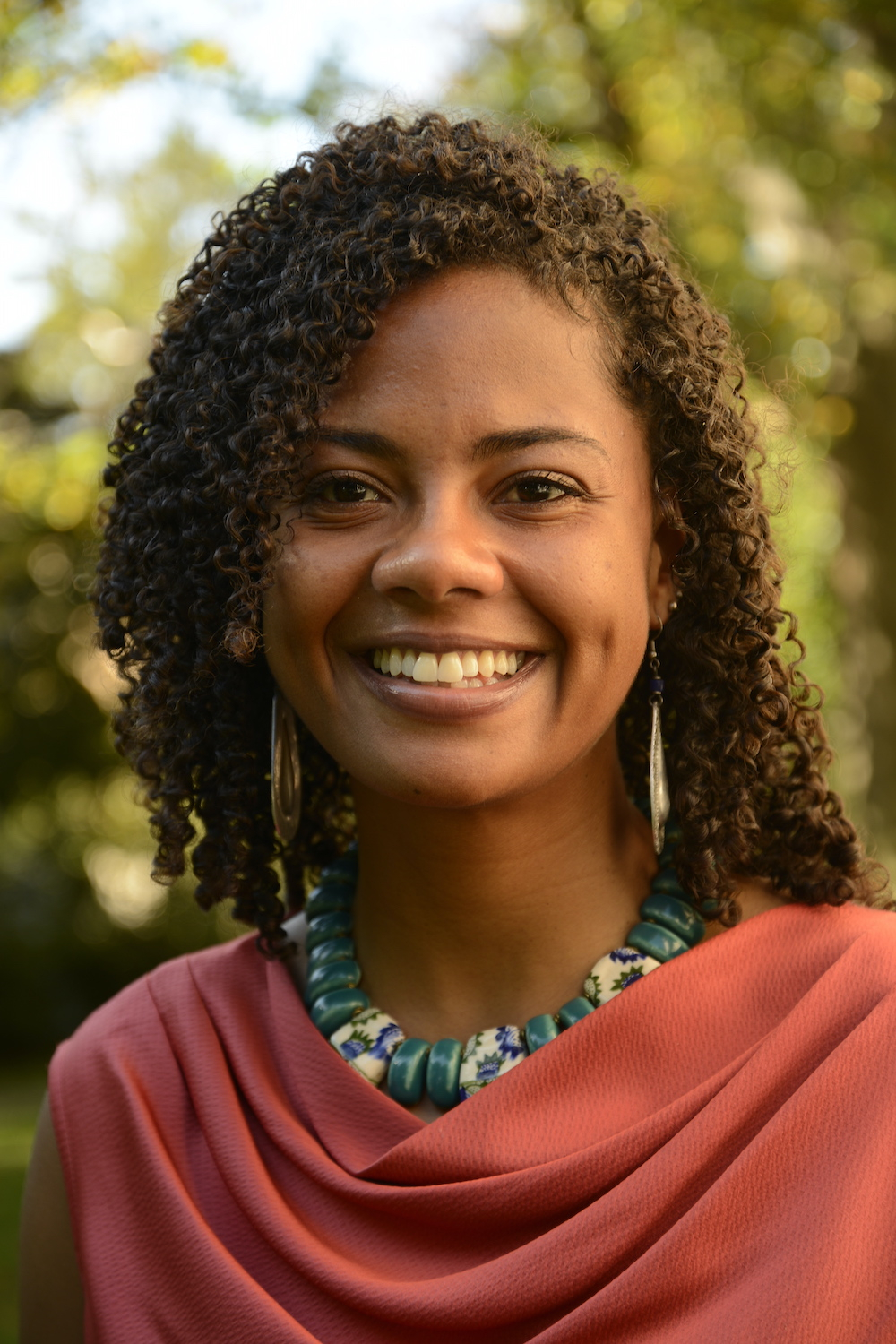 Kristina Douglass is an archaeologist who investigates how people, land-and seascapes co-evolve. She is the Joyce and Doug Sherwin Early Career Professor in the Rock Ethics Institute and Assistant Professor of Anthropology and African Studies at Penn State University. Sheis a Penn State Institutes for Energy and the Environment co-funded faculty member and a faculty affiliate of the Institute for Computational and Data Sciences. Douglass is also a Smithsonian Institution Research Associate. Her work is grounded in collaborations with local, Indigenous, and descendant (LID) communities as equal partners in the co-production of science, and the recording, preservation and dissemination of LID knowledge. Douglass and her collaborators aim to contribute long-term perspectiveson human-environment interactions to public debates, planning and policymaking on the issues of climate change, conservation, and sustainability. Since 2011 Douglass has directed the Morombe Archaeological Project (MAP), based in the Velondriake Marine Protected Area. This territory is home to diverse LID communities, including Vezo fishers, Mikea foragers and Masikoro herders. The MAP team is made up of Velondriake LID community members, and an international group of graduate students and postdoctoral researchers. The MAP is anchored at Penn State to the Olo Be Taloha Lab (@OBTLab andhttps://obtlab.la.psu.edu) for African Environmental Archaeology, which Douglass also directs. Douglass is a mother, singer, dancer, Capoeirista, SCUBA diver and avid gardener, all of which intersect in essential ways with her work as an archaeologist.
Kristina Douglass is an archaeologist who investigates how people, land-and seascapes co-evolve. She is the Joyce and Doug Sherwin Early Career Professor in the Rock Ethics Institute and Assistant Professor of Anthropology and African Studies at Penn State University. Sheis a Penn State Institutes for Energy and the Environment co-funded faculty member and a faculty affiliate of the Institute for Computational and Data Sciences. Douglass is also a Smithsonian Institution Research Associate. Her work is grounded in collaborations with local, Indigenous, and descendant (LID) communities as equal partners in the co-production of science, and the recording, preservation and dissemination of LID knowledge. Douglass and her collaborators aim to contribute long-term perspectiveson human-environment interactions to public debates, planning and policymaking on the issues of climate change, conservation, and sustainability. Since 2011 Douglass has directed the Morombe Archaeological Project (MAP), based in the Velondriake Marine Protected Area. This territory is home to diverse LID communities, including Vezo fishers, Mikea foragers and Masikoro herders. The MAP team is made up of Velondriake LID community members, and an international group of graduate students and postdoctoral researchers. The MAP is anchored at Penn State to the Olo Be Taloha Lab (@OBTLab andhttps://obtlab.la.psu.edu) for African Environmental Archaeology, which Douglass also directs. Douglass is a mother, singer, dancer, Capoeirista, SCUBA diver and avid gardener, all of which intersect in essential ways with her work as an archaeologist.
Contact Michelle Jacobson
Email mjacobson@ioa.ucla.edu
Phone
Dr. Stephen E. Nash
Director of Anthropology and the Avenir Conservation Center
Denver Museum of Nature and Science
Thursday, April 28 at 12:00pm PT
Hybrid event – In-person at A222 Fowler and Online (Zoom)
The Cotsen Institute of Archaeology invites you to a special talk presented by the Waystation Program:
During the last two decades, increasing awareness of the frequently illicit origin of archaeological objects has resulted in changes to acquisition policies in American museums. In addition, many museums are re-evaluating the ethics of collecting and working with indigenous communities to return or reinterpret sensitive cultural heritage. For more than 15 years, the Denver Museum of Nature & Science has taken a leadership role in repatriation and international returns by going above and beyond the letter of the law(s), using the principles of justice, dialogue, reciprocity, and respect to guide their activities. This talk examines the museum’s success, and occasional failure, through a series of case studies: the return of 30 vigango (ancestral grave posts) to the Mijikenda tribes of coastal Kenya, and shrunken heads to the Shuar-speaking peoples of Ecuador; the reburial of non-Native human remains in Crestone, Colorado; and the repatriation of Native American ancestors to numerous Tribal Nations in the U.S. The new Avenir Conservation Center is focused on inclusive conservation guided by source communities and may one day include a formal program to facilitate international returns and repatriations.
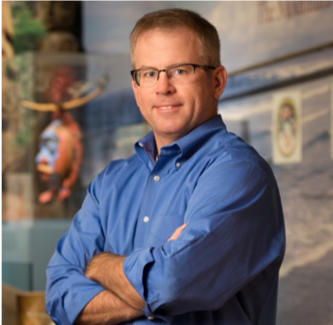 Stephen Nash, Director of Anthropology and the Avenir Conservation Center
Stephen Nash, Director of Anthropology and the Avenir Conservation Center
at the Denver Museum of Nature and Science, is an archaeologist, columnist, historian of science, and stand-up comedian. He is currently studying the Mogollon archaeology of southwestern New Mexico, Indian peace medals in the Museum’s Crane Collection, and the enchanting Russian gem carving sculptures of Vasily Konovalenko. He has written and edited seven books and dozens of peer-reviewed articles and published nearly 40 Curiosities columns for the SAPIENS online magazine. Prior to working at the Denver Museum, he served as head of collections in the Department of Anthropology at the Field Museum in Chicago.
Contact Michelle Jacobson
Email mjacobson@ioa.ucla.edu
Phone
Dr. Justin Dunnavant, Assistant Professor, UCLA Department of Anthropology
Darartu Mulugeta, Undergraduate, UCLA
As increasing calls for science communication encourage archaeologists to convey their research to diverse public audiences, we found it necessary to explore how such research was disseminated in the past. Delving into the archives of Ebony Magazine and the Johnson Publishing Company, we examine the manner in which archaeological research was communicated in the Black popular press from the 1950s into the present. The articles, authors, and subjects provide unique insight into the topics of interest to Black America and speak to the power of the Black press at educating and exciting the public about ground-breaking archaeological research. Engaging Ebony Magazine as a historical archive, we uncover little-known figures and moments in the history of African and African diaspora archaeology and offer suggestions for future directions in science communication research.
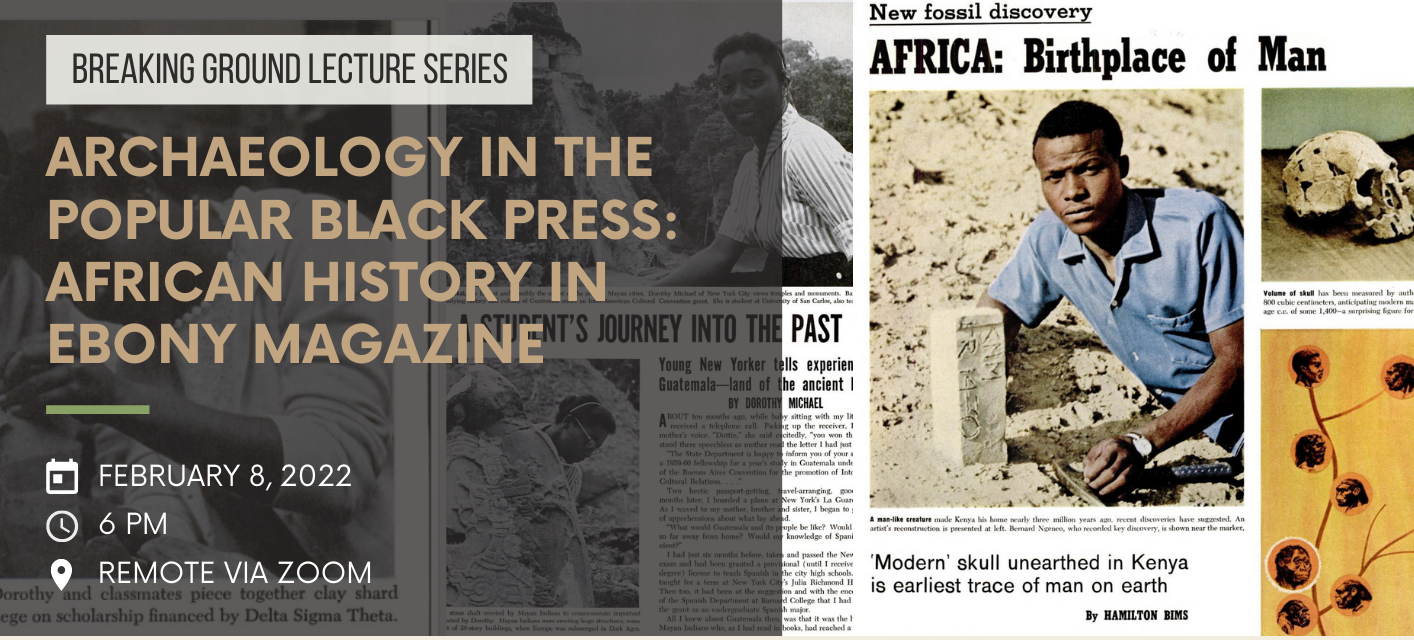
Dr. Justin Dunnavant
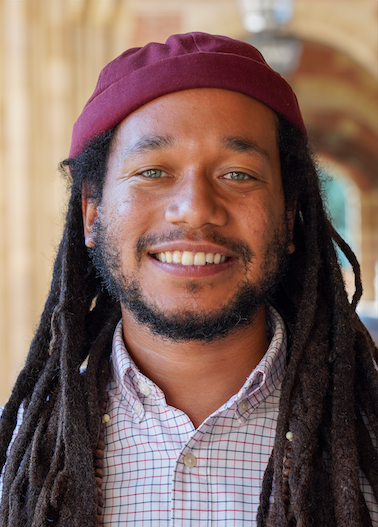 Dr. Justin Dunnavant is an Assistant Professor in the Department of Anthropology at UCLA. His current research in the US Virgin Islands investigates the relationship between ecology and enslavement in the former Danish West Indies. In addition to his archaeological research, Justin is co-founder of the Society of Black Archaeologists and an AAUS Scientific SCUBA Diver. In 2021, he was named a National Geographic Emerging Explorer and inducted into The Explorers Club as one of “Fifty People Changing the World that You Need to Know About.” He is also a member of the Board of Trustees of the National Marine Sanctuary Foundation. His research has been featured on Netflix's "Explained," Hulu's "Your Attention Please" and in print in American Archaeology and Science Magazine.
Dr. Justin Dunnavant is an Assistant Professor in the Department of Anthropology at UCLA. His current research in the US Virgin Islands investigates the relationship between ecology and enslavement in the former Danish West Indies. In addition to his archaeological research, Justin is co-founder of the Society of Black Archaeologists and an AAUS Scientific SCUBA Diver. In 2021, he was named a National Geographic Emerging Explorer and inducted into The Explorers Club as one of “Fifty People Changing the World that You Need to Know About.” He is also a member of the Board of Trustees of the National Marine Sanctuary Foundation. His research has been featured on Netflix's "Explained," Hulu's "Your Attention Please" and in print in American Archaeology and Science Magazine.
Darartu Mulugeta
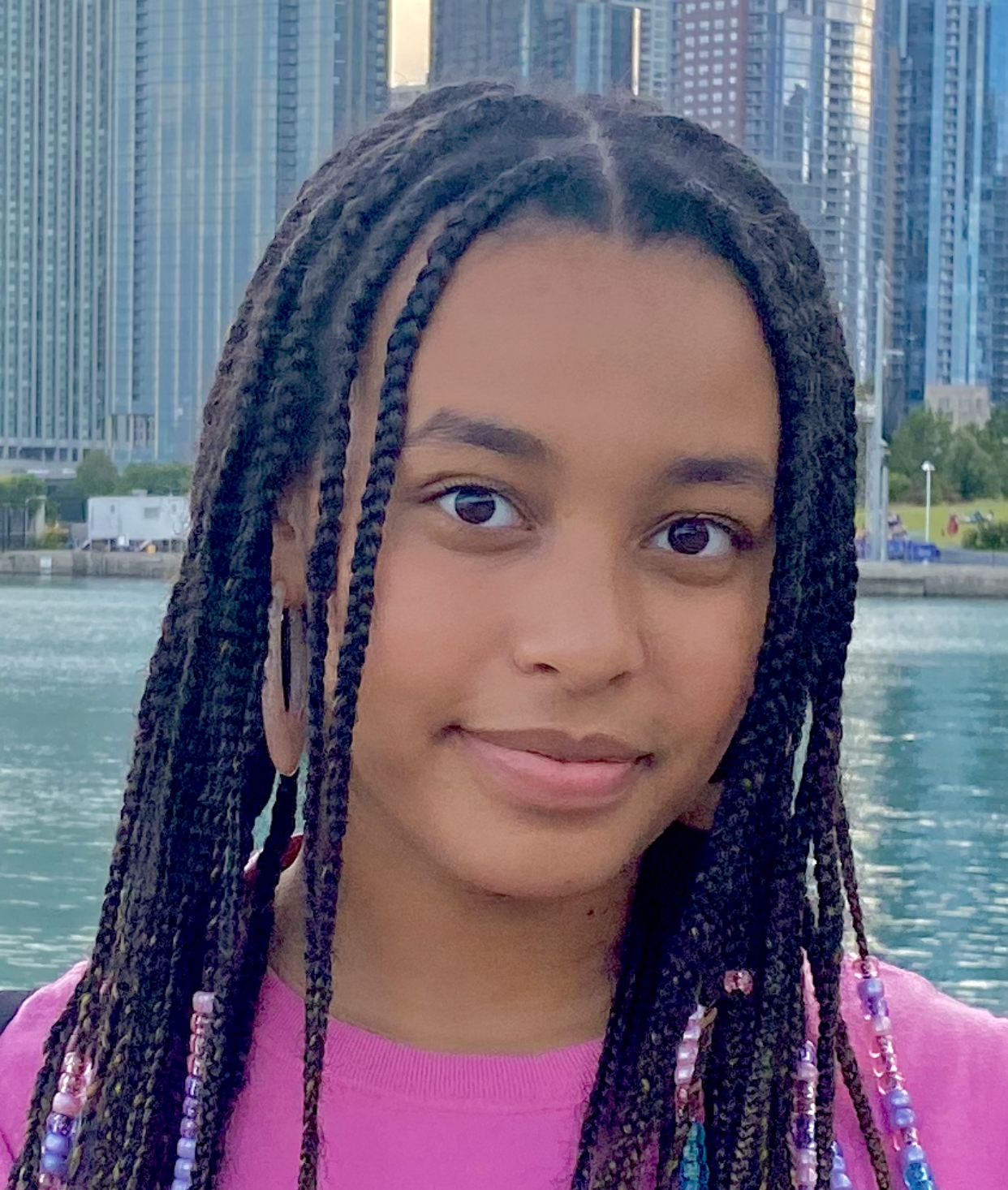 Darartu Mulugeta is a Political Science and Psychology student at the University of California, Los Angeles. She is specializing in methods and computing with the primary goal of studying African communities and history. She is currently part of the African Diaspora Archaeology Lab as a Bunche Research Fellow. Outside of school, she volunteers at the Oromo Legacy Leadership and Advocacy Association as an Oromo language teaching assistant.
Darartu Mulugeta is a Political Science and Psychology student at the University of California, Los Angeles. She is specializing in methods and computing with the primary goal of studying African communities and history. She is currently part of the African Diaspora Archaeology Lab as a Bunche Research Fellow. Outside of school, she volunteers at the Oromo Legacy Leadership and Advocacy Association as an Oromo language teaching assistant.
Contact Michelle Jacobson
Email mjacobson@ioa.ucla.edu
Phone
Join us for a virtual Round Table to celebrate Marija Gimbutas (1921–1994), UNESCO's 2021 Centennial honoree. Marija Gimbutas was a professor of archaeology at UCLA and internationally renowned for her study of the arrival of the Proto-Indo-European languages and culture in Europe. One of her most original (and controversial) contributions has been validated recently by aDNA: the Kurgan Hypothesis and the arrival into Europe of the Proto-Indo-European speakers around 3500 BC. Introduced by Ernestine S. Elster, the participants include James Mallory, David Anthony, and Dorcas Brown with Willeke Wendrich as moderator.
James Mallory was born in 1945 in California and educated at Occidental College (AB, 1963) and UCLA where he received his PhD in Indo-European Studies (European Archaeology) in 1975. In 1977 he joined the Archaeology Department at Queen’s University Belfast from which he retired as Professor of Prehistoric Archaeology in 2011. He has specialized in both Indo-European archaeology where he has published In Search of the Indo-Europeans (1989), The Encyclopedia of Indo-European Culture (1997), and The Oxford Introduction to Proto-Indo-European and the Proto-Indo-European World (2006) and Irish Archaeology (The Archaeology of Ulster, 1991; The Origins of the Irish, 2013; and In Search of the Irish Dreamtime, 2016). He is a member of the Royal Irish Academy.
David Anthony is an archaeologist of the Eurasian steppes (esp. Russia, Ukraine, & Kazakhstan), known for his interdisciplinary research on the origins and spread of Indo-European languages, combining evidence from archaeology, ancient human DNA, linguistics, and comparative mythology. His most significant book, The Horse, the Wheel, and Language: How Bronze Age Riders from the Eurasian Steppes Shaped the Modern World, won the Society for American Archaeology prize for best scientific book in 2010. His entry into the Indo-European debate was facilitated by Marija Gimbutas’s groundbreaking English-language syntheses of eastern European archaeology. He is an associate in the Department of Human Evolutionary Biology at Harvard University, working in David Reich’s ancient DNA lab; and an emeritus professor at Hartwick College, Oneonta, NY.
Dorcas Brown was co-director of grant-supported studies of museum collections in Russia, Ukraine, Kazakhstan, and Hungary (her advanced degree is in Museum Studies); and later of archaeological excavations in the steppes near Samara, Russia and Razdolnoe, Ukraine. Singly or together, Brown and Anthony have published 70+ articles and chapters, including since 2015 three co-authored in Science and three in Nature on a variety of related topics: Bronze Age migrations out of the steppes proven by ancient DNA, with profound implications for the Indo-European debate; the domestication of the dog, from ancient wolf & dog DNA; the domestication of the horse, from ancient horse DNA; the origin of dairying in the steppes, based on dairy peptides preserved in dental calculus; and male adolescent initiation-into-warrior rituals, connected with their discovery and excavation of a Bronze Age boys’ initiation site in the Volga steppes. She is retired from Hartwick College.
Introductions by Ernestine S. Elster. Elster was a graduate student of Gimbutas and participated in four of her archaeological expeditions. She is currently the director of the Mediterranean Laboratory at the Cotsen Institute.
Moderated by Willeke Wendrich, Professor, UCLA Department of Near Eastern Languages and Cultures, is the Director of the Cotsen Institute of Archaeology.
Contact Michelle Jacobson
Email mjacobson@ioa.ucla.edu
Phone
Tessa de Alarcon, Grace Jan, Almoatz-bellah Elshahawi
Friday May 21st, 11:00am - 12:30pm (PT)
Tessa de Alarcon
How working in the US and Guatemala has Influenced the Way I Think About Conservation
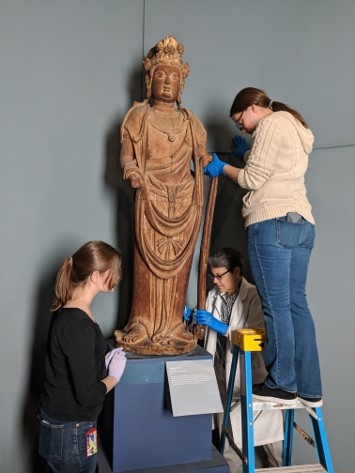 I will briefly discuss my experiences working in Guatemala as compared to working in the United States and reflect on how those experiences have impacted the way I work as a conservator. I am a Guatemalan American, I was born and raised in the US but have lived and worked in both the US and Guatemala. My introduction to conservation occurred in Guatemala and my first pre-program internship was there, as well. As a result, my introduction to best practices, ethics, and material evaluation all occurred in Guatemala. I then returned to the US for graduate school. Since obtaining my degree, I have worked on site in Guatemala and taught workshops there, in addition to working at the Penn Museum in Philadelphia as a project conservator. My exposure to different approaches, challenges, and issues in cultural heritage preservation has shaped me as a conservator. It has given me a unique perspective on decision making. In particular, I think it has helped me challenge assumptions and reflect on the way that a single problem can have many different possible solutions.This is not intended to be a formal presentation and will be very much based on my personal experiences and perspective.
I will briefly discuss my experiences working in Guatemala as compared to working in the United States and reflect on how those experiences have impacted the way I work as a conservator. I am a Guatemalan American, I was born and raised in the US but have lived and worked in both the US and Guatemala. My introduction to conservation occurred in Guatemala and my first pre-program internship was there, as well. As a result, my introduction to best practices, ethics, and material evaluation all occurred in Guatemala. I then returned to the US for graduate school. Since obtaining my degree, I have worked on site in Guatemala and taught workshops there, in addition to working at the Penn Museum in Philadelphia as a project conservator. My exposure to different approaches, challenges, and issues in cultural heritage preservation has shaped me as a conservator. It has given me a unique perspective on decision making. In particular, I think it has helped me challenge assumptions and reflect on the way that a single problem can have many different possible solutions.This is not intended to be a formal presentation and will be very much based on my personal experiences and perspective.
Tessa de Alarcon has been a project conservator at the Penn Museum in Philadelphia since 2012. She 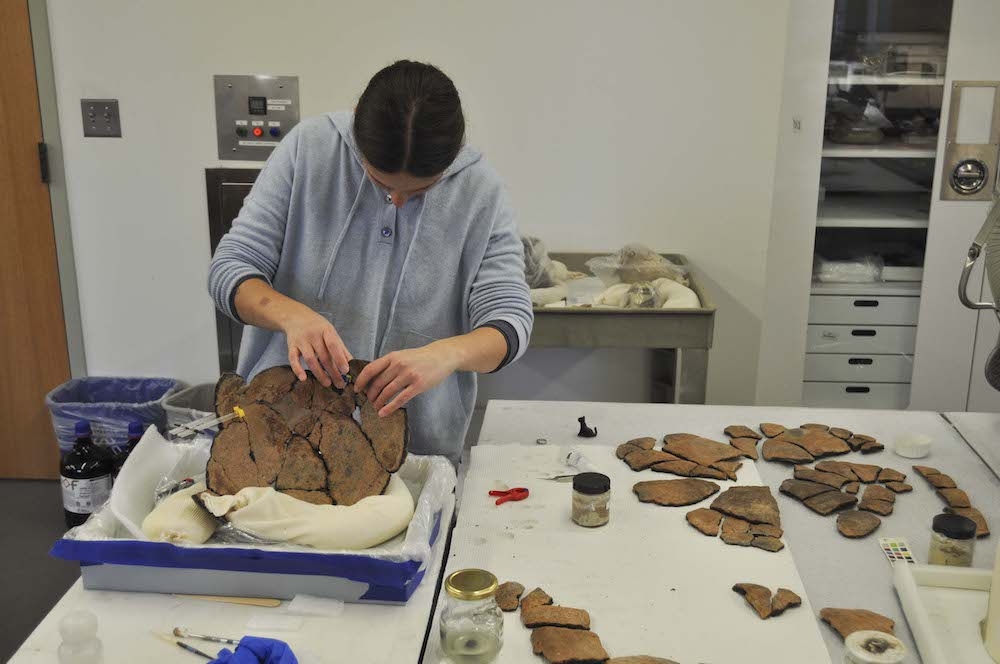 was born and raised in the US but has lived and worked both in the US and Guatemala. Her introduction to conservation occurred while working as an intern at Casa Santo Domingo in Antigua,Guatemala. During her time at the Penn Museum she has worked on a variety of different projects including condition assessments, and gallery renovation projects. She has also worked as an archaeological field conservator.The bulk of her field work has been in Guatemala,but most recently she had the opportunity to work in Azerbaijan. She has also taught workshops on documentation and archaeological conservation at the Museo Nacional de Arqueología y Etnologíain Guatemala City.She received her MA from the UCLA/Getty Program in the Conservation ofArchaeological and Ethnographic Materials in 2012.
was born and raised in the US but has lived and worked both in the US and Guatemala. Her introduction to conservation occurred while working as an intern at Casa Santo Domingo in Antigua,Guatemala. During her time at the Penn Museum she has worked on a variety of different projects including condition assessments, and gallery renovation projects. She has also worked as an archaeological field conservator.The bulk of her field work has been in Guatemala,but most recently she had the opportunity to work in Azerbaijan. She has also taught workshops on documentation and archaeological conservation at the Museo Nacional de Arqueología y Etnologíain Guatemala City.She received her MA from the UCLA/Getty Program in the Conservation ofArchaeological and Ethnographic Materials in 2012.
Grace Jan
The Cross-cultural Evolution of Chinese Painting Conservation
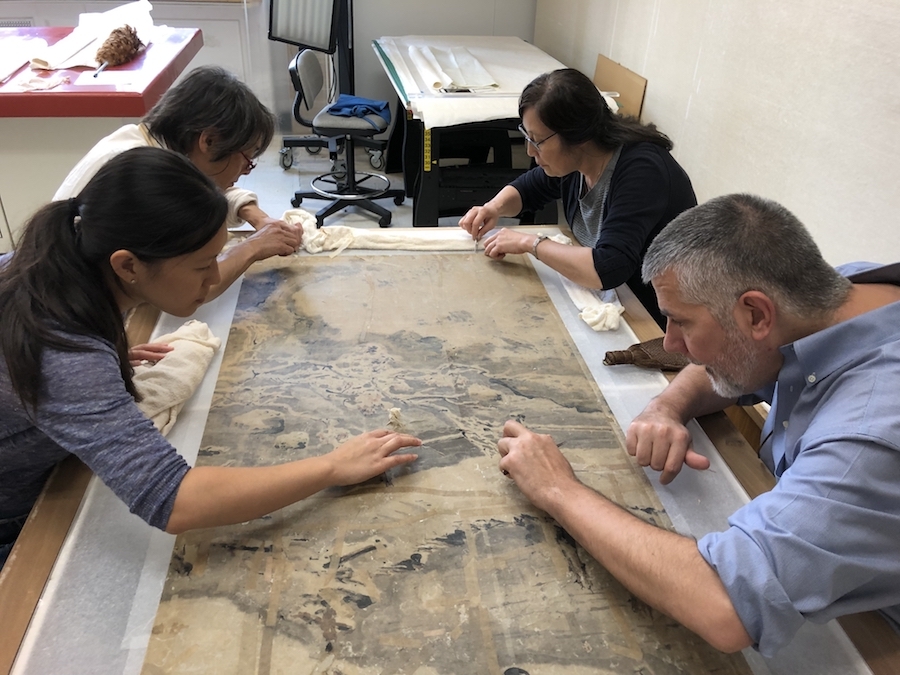 Freer Gallery of Art and Arthur M. Sackler Gallery, the Smithsonian's National Museum of Asian Art
Freer Gallery of Art and Arthur M. Sackler Gallery, the Smithsonian's National Museum of Asian Art
My ten-year career in Chinese painting conservation has provided cross-cultural experiences and insights into this evolving field. This talk will discuss this evolution in Chinese painting conservation education and training, culturalinitiatives, and techniques.
Chinese painting conservation requires specialized skills that were traditionally passed down through apprenticeship training. But over the last twenty years, significant changes to access and knowledge of Chinese painting conservation haveled toprogress and challenges in the field, impacting its practice domestically and within China.
This evolution is reflected in U.S. initiatives by the Freer Gallery of Art and Arthur M. Sackler Gallery, the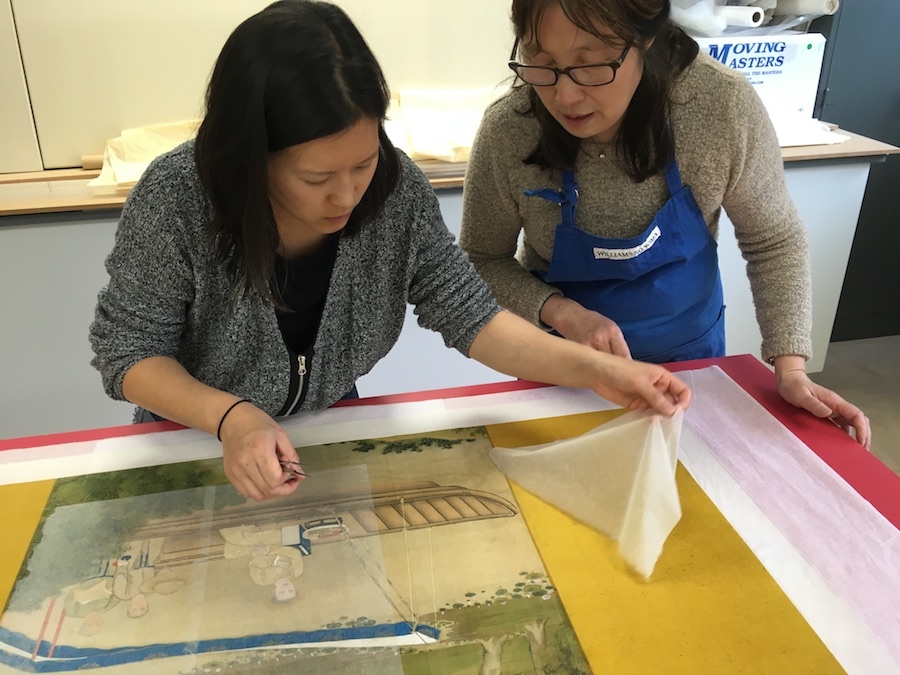 Smithsonian's National Museum of Asian Art,and theAndrew W. Mellon Foundation. In 2000, the Freer and Sackler established the Chinese Painting Conservation Program, an initiative to train young professionals and develop cooperative projects promoting the care of Chinese paintings.In 2012, the Mellon Foundation furthered support of trainingand exchanges among conservators, and helped to endow a Chinese painting conservation position and fellowship program. These efforts helped establish a training pipeline of conservators.
Smithsonian's National Museum of Asian Art,and theAndrew W. Mellon Foundation. In 2000, the Freer and Sackler established the Chinese Painting Conservation Program, an initiative to train young professionals and develop cooperative projects promoting the care of Chinese paintings.In 2012, the Mellon Foundation furthered support of trainingand exchanges among conservators, and helped to endow a Chinese painting conservation position and fellowship program. These efforts helped establish a training pipeline of conservators.
Concurrently in China, I have observed a shift in training, from a traditional apprenticeship model to formalized degree programs. This has occurred alongside a nationwide prioritization of Chinese culture and heritage resulting in new museums and state-of-the-art conservation facilities. In addition, conservators have increased exposure to the diversity of conservation approaches across different regions of China.
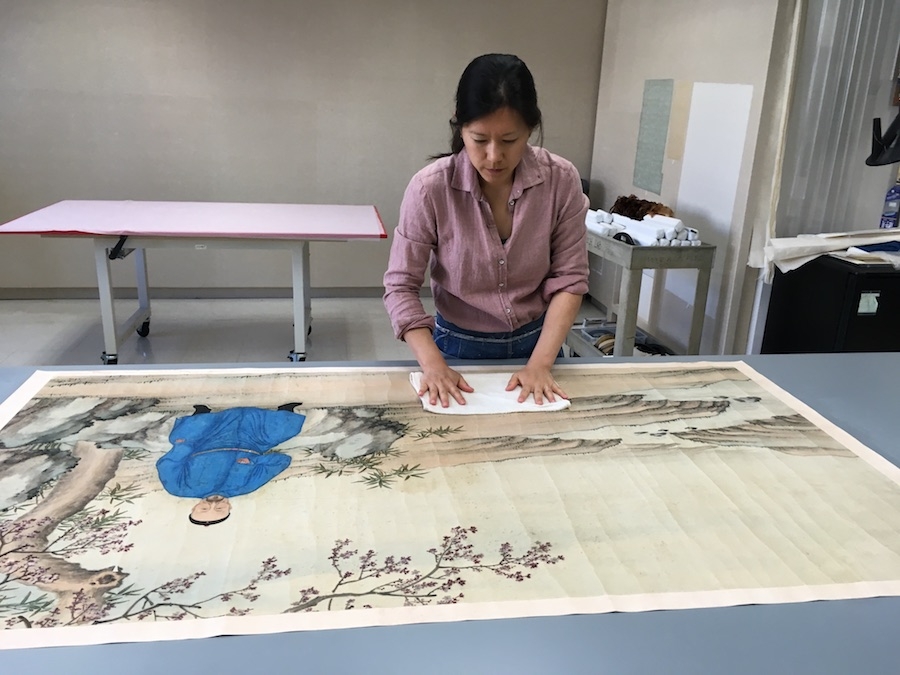
My cross-cultural career has provided perspective on how the field could integrate Western and Chinesemethods. Shortened formalized training could be integrated with the apprenticeship model, ensuring the sustainability of Chinese traditional conservation. Implicit in all this is the merging of these cultures. In response, domestic and international collaboration and networks are crucial to advancing the field and leveraging knowledge and resources across the field.
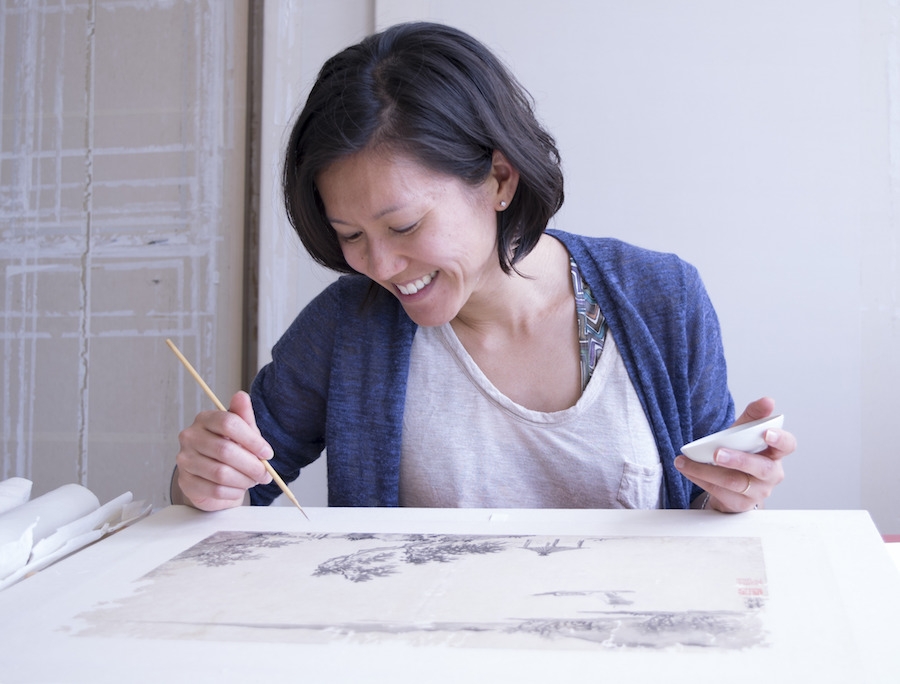 Grace Jan is the Yao Wenqing Chinese Painting Conservator at the Freer Gallery of Art and Arthur M. Sackler Gallery, the Smithsonian’s National Museum of Asian Art. Since 2009, she has worked on the museum’s Chinese painting and calligraphy collection and supported the museum’s Chinese Painting Conservation Program to promote domestic and international exchange and collaboration. She is active in facilitating the Andrew W. Mellon supported initiative to develop and promote this specialization across the U.S. Ms. Jan received anMAin Art History and Advanced Certificate in Conservation from the Institute of Fine Arts Conservation Center, New York University. Shetrained at the Shanghai Museum, Beijing Palace Museum, Metropolitan Museum of Art and the Museum of Fine Arts, Boston.
Grace Jan is the Yao Wenqing Chinese Painting Conservator at the Freer Gallery of Art and Arthur M. Sackler Gallery, the Smithsonian’s National Museum of Asian Art. Since 2009, she has worked on the museum’s Chinese painting and calligraphy collection and supported the museum’s Chinese Painting Conservation Program to promote domestic and international exchange and collaboration. She is active in facilitating the Andrew W. Mellon supported initiative to develop and promote this specialization across the U.S. Ms. Jan received anMAin Art History and Advanced Certificate in Conservation from the Institute of Fine Arts Conservation Center, New York University. Shetrained at the Shanghai Museum, Beijing Palace Museum, Metropolitan Museum of Art and the Museum of Fine Arts, Boston.
Almoatz-bellah Elshahawi
An Ancient Egyptian Ptolemaic Coinage: History and Preservation Methods
Ancient coins are one of the most important sources of information from which archaeologists and 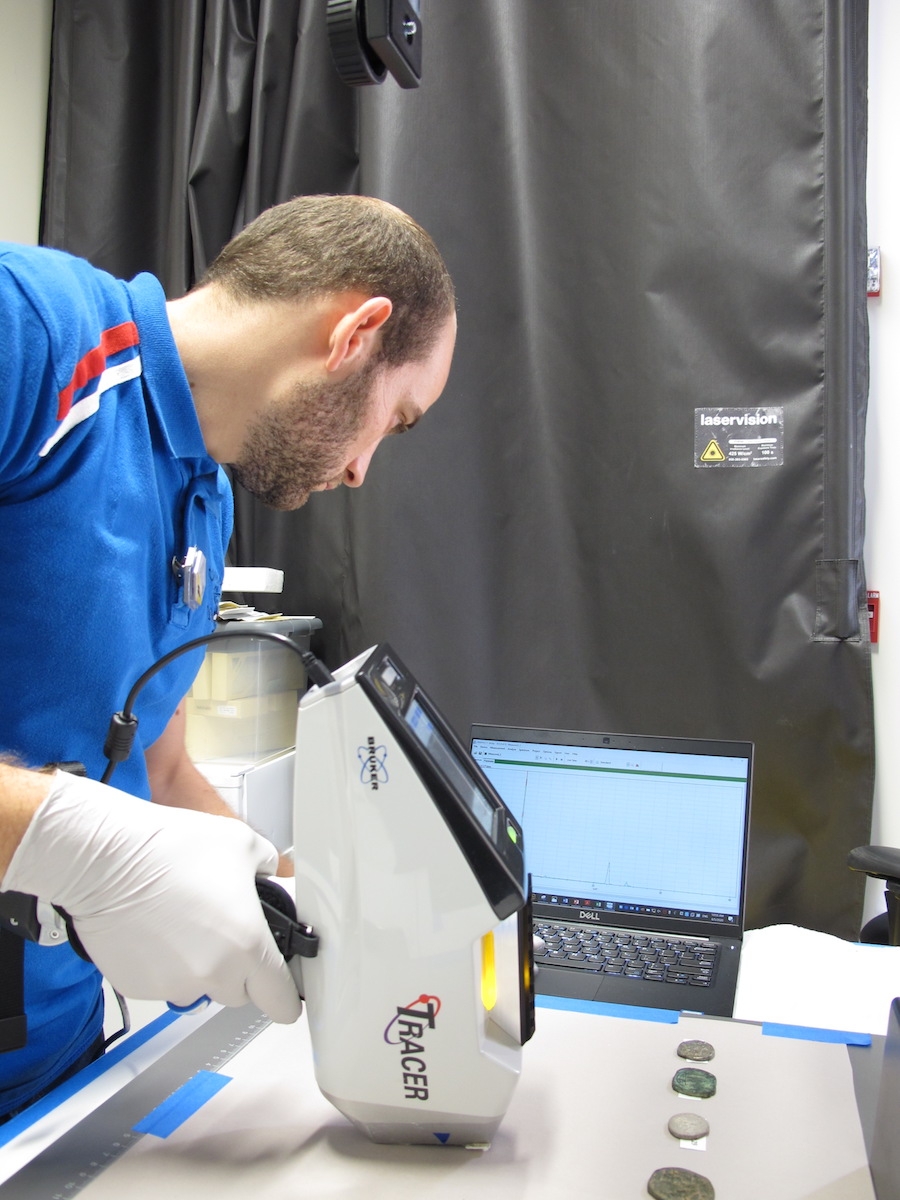
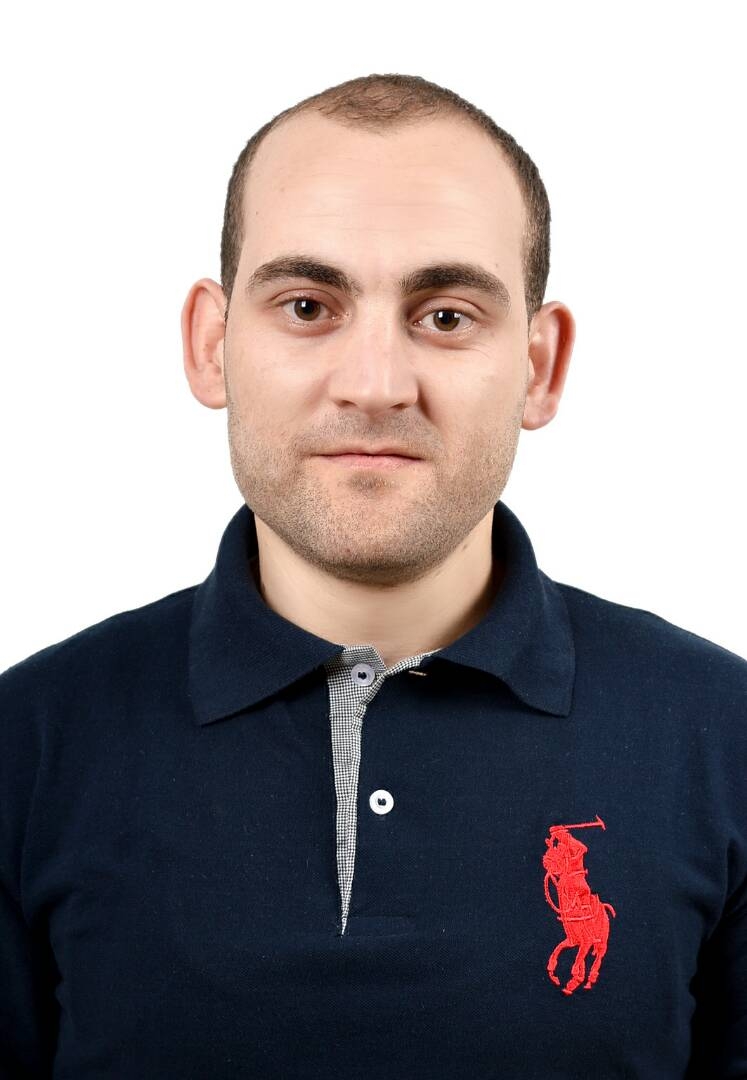 Almoatzbellah Elshahawi a PhD candidate in the conservation at Cairo University, specializing in ancient Egyptian works on Metals and Coins. He is a graduatedintern at the J. Paul Getty Museum for one year(2019-2020). For the dissertation, he is researching on the evaluation of the efficiency of environmental inhibitors with Nano-reinforcement for the protection of archaeological bronze. He received a Master’s degree in Conservation, Cairo University, 2017. AlmoatzbellahElshahawi was a 2013-2017 Cairo university Fellow. A 2005-2009 Abou-Qir high conservation institute Fellow and most recently, an objectconservator at the Grand Egyptian Museum-Conservation Center (GEM-CC).
Almoatzbellah Elshahawi a PhD candidate in the conservation at Cairo University, specializing in ancient Egyptian works on Metals and Coins. He is a graduatedintern at the J. Paul Getty Museum for one year(2019-2020). For the dissertation, he is researching on the evaluation of the efficiency of environmental inhibitors with Nano-reinforcement for the protection of archaeological bronze. He received a Master’s degree in Conservation, Cairo University, 2017. AlmoatzbellahElshahawi was a 2013-2017 Cairo university Fellow. A 2005-2009 Abou-Qir high conservation institute Fellow and most recently, an objectconservator at the Grand Egyptian Museum-Conservation Center (GEM-CC).
Contact Jennifer McGough
Email jenmcgough@g.ucla.edu
Phone
- ‹ previous
- 2 of 7
- next ›



